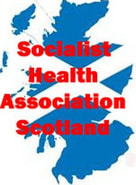What does impact on the NHS in Scotland is the spending plans of the parties. Spending on the NHS in England feeds into the Barnett formula, which determines the overall Scottish budget. Unless of course the SNP get their Full Fiscal Responsibility, in which case Barnett will be abolished and NHS funding will rely entirely on revenues raised in Scotland. How much of the Barnett consequentials are spent on the NHS, or wider health issues, is a matter for the Scottish Parliament, not MPs.
We should also remember that while the NHS is devolved, reserved matters do impact on the health of the nation - welfare spending and the minimum wage in particular. The Tories plan to cut a further £12bn from welfare spending will do as much damage to health inequalities as their undermining of the NHS in England.
So, it's probably the money that matters most. Over the past five years, NHS spending in England has had a degree of protection. While overall spending has fallen 13% in real terms, the amount spent on health has risen 4%. It's only a degree of protection because health inflation always exceeds the inflator used to calculate what 'real terms' means.
The UK government claims it added £1.3bn in cash terms to the Scottish block grant as a consequence of NHS spending in England over five years. The Institute for Fiscal Studies says the amount spent on NHS Scotland has fallen in real terms up to last year, by 1%. That still leaves spending per head in Scotland more than £1,000 ahead of England. In comparative terms English health spending rose by 6% in real terms, while Scottish NHS spending rose by roughly 1%. Now, if that meant that resources had been diverted into broader health spending, such as social care, that might not be a bad thing. However, as councils have borne the brunt of austerity cuts in Scotland, that doesn't appear to be the case.
It's not just health inflation that is increasing spending pressures on the NHS across the UK. As new health technology, treatments, procedures and medicines develop, the demand for them increases. In addition we are living longer, although not always healthily, and that puts further pressure on health and social care.
Simon Stevens, the head of NHS England, says the health service in England needs £30bn more by 2020, on top of inflation increases. He argues that better management, new ways of working and efficiency measures could find £22bn of that, leaving an £8bn gap. The pressures in Scotland are if anything worse, given that demographic pressures are greater. That would indicate that at least £3bn extra is required, or put another way, a 25% real terms increase in the NHS Scotland budget. Most are sceptical about Simon Stevens claims on efficiency savings, so it would be optimistic to bank on them. Particularly as they would involve difficult political decisions such as hospital centralisation, closing A&E departments etc.
Of course this is academic if the SNP have enough influence to insist on their Full Fiscal Responsibility. As the IFS has calculated, that would result in a budget cut of £9.7bn by 2019/20. At today's prices that's the equivalent of about two-thirds of the Scottish health budget. The IFS has also shown that Labour's spending plans would bring austerity to an end sooner. Full Fiscal Austerity is a better description of this crazy plan.
In summary, don't worry about operational pledges - follow the money. The Tories will of course slash spending the most for ideological reasons. The Lib Dems will give you austerity light and the SNP's FFR will deliver Tory austerity all over again. Labour's plan may not be perfect, but without doubt it's the best on offer for health in Scotland.

 RSS Feed
RSS Feed